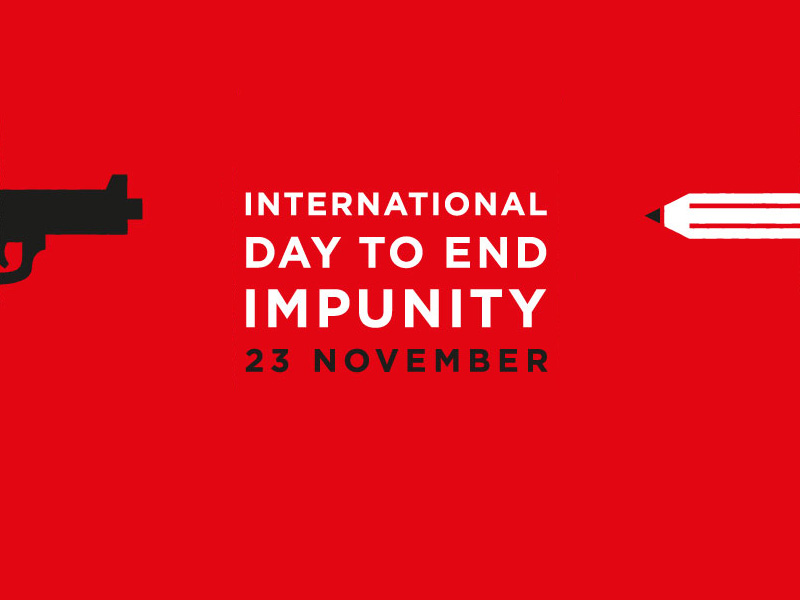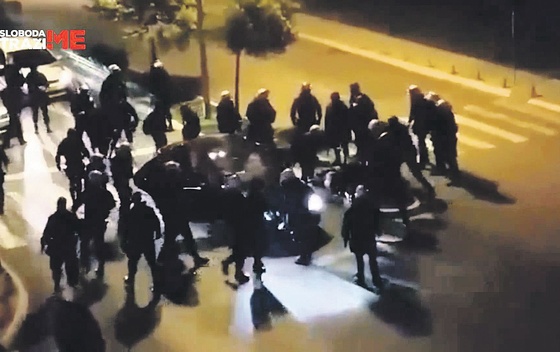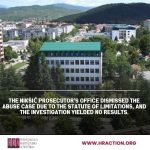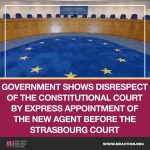
2/11/2017 ON THE INTERNATIONAL DAY TO END IMPUNITY FOR CRIMES AGAINST JOURNALISTS
02/11/201716/11/2017 COUNCIL OF THE CONSTITUTIONAL COURT OF MONTENEGRO FAILED TO ADOPT THE COMPLAINT OF JOURNALIST TUFIK SOFTIĆ FOR UNKNOWN REASONS -THE SESSION OF ALL JUDGES WILL DECIDE
16/11/20178/11/2017 MARTINOVIĆ CASE: DECISION OF THE CONSTITUTIONAL COURT OF MONTENEGRO IN CASE OF INNEFFECTIVE INVESTIGATION OF POLICE TORTURE

The Constitutional Court of Montenegro executed and communicated the decision in the case of unpunished police torture of Milorad Martinović. The Constitutional Court adopted Martinovic’s constitutional complaint and found that he was a victim of a violation of Article 28 of the Constitution of Montenegro and Article 3 of the European Convention on Human Rights (prohibition of torture), both because of the torture he suffered from the police and because the State Prosecutor’s Office did not effectively investigate it ever since 24 October 2015.
The Constitutional Court ordered “the Basic State Prosecutor’s Office in Podgorica to take other appropriate measures and actions to enforce a fundamental, rapid and independent investigation, which should ensure the identification and prosecution of police officers of the Montenegrin Police Directorate – Special Anti-Terrorist Unit, who are suspected of committing the criminal offense of abuse at the detriment of the applicant, referred to in Article 167, paragraph 2, in relation with paragraph 1 of the Criminal Code, in conjunction with the criminal offenses of grievous bodily harm under Article 151, paragraph 1 of the Criminal Code, and the destruction and damage to someone else’s property from Article 253, paragraph 2, regarding paragraph 1 of the Criminal Code.”
The Constitutional Court ordered the Basic State Prosecutor’s Office in Podgorica to execute the decision within three months and to submit the report on what had been done.
Although the decision in the case of Martinović was delivered already on 25 July 2017, it was executed and communicated only three months after, on 6 November 2017, and is still not been published in the Official Gazette of Montenegro. Therefore, the quarterly deadline in which the Basic State Prosecutor’s Office in Podgorica is obliged to implement all necessary actions has not yet started to run. As the Constitutional Court stated in the decision that the Basic State Prosecutor’s Office did not provide for an urgent investigation and ordered them to now implement it urgently, the delay of the Constitutional Court in executing the decision and publicizing it in the Official Gazette of Montenegro does not support seriousness of the order for urgent investigation.
The Constitutional Court previously, in two related decisions on the failure of the state prosecutors to execute effective investigation of police ill-treatment of citizens Branimir Vukčević and Momčilo Baranin in Jewellers’ Street (“Zlatarska” street) ordered the Basic State Prosecutor’s Office in Podgorica to execute the decision within three months and to submit them the report on what has been done. As this deadline expired, the director of the HRA representing Vukčević and Baranin in that proceeding, asked the Constitutional Court to provide access to the report.
In the decision regarding the Martinović case, the Constitutional Court stated that the duty of the state prosecutor’s office was to thoroughly investigate police torture and “scrutinize the police version of the events”. However, it was concluded that in this case the competent state prosecutor in the Basic State Prosecutor’s Office in Podgorica obviously was not prepared to scrutinize police reports as he did not pose a single question to any of the participants:
“… The Constitutional Court considers that, although it is true that the competent state prosecutor questioned the complainant and the witness of the event, he did not pose a single question to any of them. Further, although later, in the case Kt. 1126/15, the competent state prosecutor heard all members of the Special Anti-Terrorist Units, despite the fact that, bearing in mind the footage that clearly shows how the event occurred, it is obvious that none of the police officers spoke the truth in an effort to avoid criminal responsibility, they were not asked any questions. Accordingly, there is no indication that the competent state prosecutor was prepared to examine the police report about the incident… “(page 22 of the decision).
It was also determined that the state prosecutor did not allow Martinović and the witness to identify police officers:
“What the Court considers particularly striking is that even though the applicant (at the hearing by the State Prosecution Office) and witness M.K. (during a hearing by the Police Directorate) clearly stated that they would be able to identify the respective police officers, if they had the opportunity to see them personally, nothing was done to enable them to do so” (page 22 of the decision).
Finally, it was concluded that the state prosecution, “incomprehensibly,” persistently asked the police to identify the perpetrators, although it was obliged to conduct an independent investigation and directly investigate the police:
“… persons responsible for the investigation, and those who conduct the investigation, must be independent of those who participated in the disputed event, and therefore it is incomprehensible that the State Prosecution seeks the gather of data and evidence from the head of a police unit whose members are suspected of committing a criminal offense … The Constitutional Court considers that the competent State Prosecutor’s Office conducted an investigation in a manner that does not meet the standard of independence of the investigation because it continuously required from the Police Directorate to take measures and actions to identify police officers, ignoring that police officers, from which an investigation is required, are subordinated to the same command chain as those officers who were interrogated” (page 23 of the decision).
The Constitutional Court noted that Basic State Prosecutor’s Office in Podgorica submitted 14 written requests and urgent appeals to the Chief of the Security Centre in Podgorica, the Director of the Police Directorate and the Minister of the Interior Affairs (page 10 of the decision). It was also noted that the Police Directorate acted illegally because they did not cooperate with the state prosecutor’s office and never took any measure to make the report on the use of the means of coercion of the Special Anti-Terrorist Units in accordance with the regulations (page 21 of the decision).
It was also concluded that the fact that the State Prosecution filed indictments against the Commander of the Special Anti-Terrorist Unit and two members of that unit does not mean that an effective investigation was conducted “in view of the fact that those two persons admitted on their own to having committed a criminal offense” (page 23).
Finally, it was found that there is “… a serious suspicion of the State Prosecutor’s readiness to conduct an independent investigation” and concluded that “… the investigation of serious allegations of the applicant’s ill-treatment was not fundamental and that the competent State Prosecutor’s Office failed to take all reasonable and available measures to ensure the evidence …” (p. 23).
Therefore, the Constitutional Court found, after two very similar decisions in the case of police abuse in the Jewellers’ Street, that in this case the Basic State Prosecutor’s Office in Podgorica was not ready to confront the police and escaped from their responsibility to investigate members of the police, contrary to professional duties of applying laws and protecting human rights. Therefore, HRA again appeals to the Supreme State Prosecutor, Ivica Stanković, to urgently provide for the rule of law in the form of effective investigation of police torture in the case of Milorad Martinović, as well as to establishing the responsibility of all those in the State Prosecutor’s Office and the Police Directorate who have so far obstructed the investigation, as determined in the decision of the Constitutional Court. The Government of Montenegro would also need to deal with illegal actions of the Police Directorate both in executing torture as well as in the investigation of that event, and ensure that the police do not employ those who are beating citizens and those who are hiding them.
HRA recalls that the UN Committee Against Torture, which will review Montenegro again in 2018, in addition to investigating and punishing direct perpetrators of torture, considers essential investigation and prosecution of superior officers responsible for complicity in torture and other ill-treatment and through direct incitement or encouragement, or acceptance and concealment (CAT, General Comment No. 2, Implementation of Article 2 by States Parties, p. 26). Processing of the Commander of the Special Anti-Terrorist Unit in this case for Criminal offense Providing assistance to the perpetrator after the committed criminal offense, does not include all those who were obliged in this case to ensure the legitimate conduct of the Police Directorate, and failed to do so.
The Constitutional Court’s decision in the case of Milorad Martinović in Montenegrin is available here.








 English
English